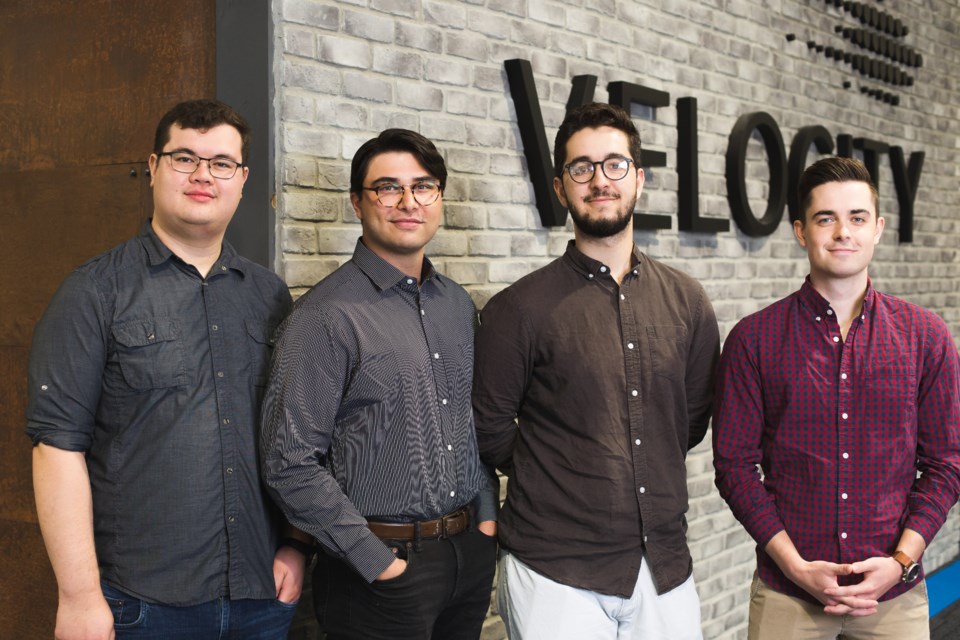A Kitchener-based startup has developed a new battery system for electrifying underground mining vehicles, and Sudbury is poised to play a key role in moving the technology toward commercialization.
Stacktronic has created a modular battery system that can be pieced together like Lego blocks to produce a battery of any size, any shape and any capacity, depending on the needs of the vehicle.
It’s a solution that could potentially save time and money for mining operations.
It began as a capstone project for a group of mechanical engineering students in their final year studying at the University of Waterloo, noted Keith Teeple, one of the founders.
Though it was initially devised for use by researchers running tests in the lab, the group quickly realized how well the idea fit the needs of the mining industry.
“Mining vehicles are specialized, they have some pretty funky shapes and geometries, and they need to be able to fit into small spaces, so you don’t always have the luxury of big, rectangular cavities on board a vehicle to fit on board a large battery pack,” Teeple said.
“By taking the super modular approach, we can fit into a space that’s already on board the vehicle. So you don’t need to redesign the chassis to accommodate a big, bulky battery pack. We can fit into the space we’ve already got on board and make use of that existing space.”
Research into the system began in 2018, and the company incorporated last June.
Want to read more stories about business in the North? Subscribe to our newsletter.
Teeple said Stacktronic is also working to develop a new technology – they call it “four-terminal technology” – that increases a battery’s energy capacity, improves its charging efficiency, prolongs battery life, and offers better serviceability.
“We were actually really surprised that battery suppliers have basically left mining behind as a market,” Teeple said.
“There are obviously battery suppliers that will supply to mining, but they’re not designed from the ground up for these vehicles, and mining is a whole different ballgame from highway vehicles.”
Earlier in March, Stacktronic announced it’s partnering with Mayhew Performance to undertake one of the first pilot projects in the Sudbury area.
This fall, the partners will repurpose a personnel carrier, outfitting it with Stacktronic’s modular battery system and transform it from diesel to battery-electric.
The project will kick off in early April and the vehicle is expected to be revealed during MINExpo in Las Vegas in late September.
It will then be put through its paces during a 90-day pilot test in an as-yet-unnamed underground mining operation, with the team on site to monitor the vehicle’s performance.
“In the initial pilots, we want to be hands-on because I think it’s really important that we listen and really learn about what are the pain points for these customers,” Teeple said. “To get that type of insight, you really have to be present.”
Mike Mayhew, who launched Mayhew Performance in February, is the former mine superintendent at Kirkland Lake Gold’s Macassa Mine where he played an integral role in integrating the Z40, a 40-tonne haul truck manufactured by Artisan Vehicles.
Today, trucks and load haul dump (LHD) vehicles are among Kirkland Lake Gold's battery-electric fleet underground, which Mayhew said is responsible for 80 per cent of the mine’s overall production.
Because he strongly believes that battery-powered mining vehicles are the future of the industry, Mayhew said it was a “no-brainer” to get involved with a smart, young startup like Stacktronic.
“I really like the project offering they proposed to me,” he said.
As companies continue toward becoming zero-emission operations, Mayhew believes demand for battery-electric vehicles will ramp up. But available solutions are currently limited to new technology.
“All these players that are out there, they’re focusing right now on new technology and new equipment,” Mayhew said. “Nobody’s touched the repurposed side of the market, and nobody’s really figured out how they’re going to do this.”
He admits the option of repurposing a vehicle won’t have universal appeal, and part of his role in the partnership will be to work with companies to figure out what solution works best for them.
“This is not a solution to everybody in all mines,” he emphasized. “It all depends on your approach; it depends on your budget; it depends on your commodity.”
Stacktronic has set a fairly “aggressive” timeline for reaching commercialization, Teeple said.
It’s currently looking to raise funds to finance a summer manufacturing run, and bring on staff to handle sales and software development.
The company wants to complete its minimum viable product by the end of April or early May, and follow with a low-volume manufacturing run of 100 to 200 batteries over the summer.
By the end of the year, Teeple said, Stacktronic wants to be working with one to three pilot partners that can test the batteries on vehicles as part of normal mining duties.
“As a small outfit, we have the luxury of moving very fast, where we’re agile and flexible,” he said. “It’s aggressive, but we think totally manageable.”




